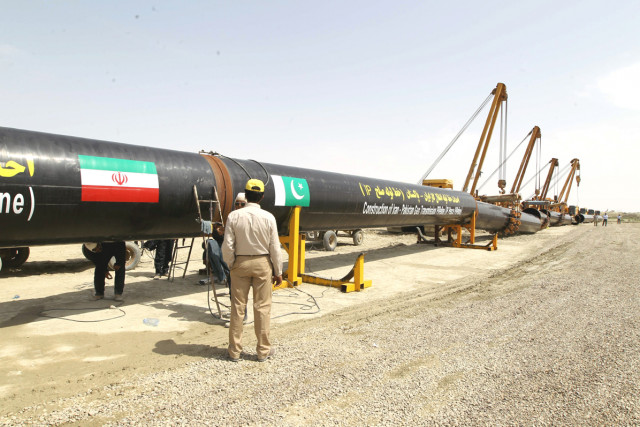Iran, Pakistan: Pipeline deal inked under bilateral treaty, says expert
No need to convert gas purchase agreement into treaty to avoid sanctions.

Fine: $2m per day is the penalty Pakistan will have to pay if it fails to complete the pipeline project on time. PHOTO: AFP/FILE
Pakistan and Iran have signed the gas pipeline deal in line with an existing bilateral treaty, which reflects a sovereign act, says renowned expert in international law Ahmer Bilal Soofi.
It is an international treaty that cannot be defeated by the domestic law of any state that unilaterally imposes sanctions. “There is no need to re-enter into another bilateral treaty or ‘convert’ the existing gas purchase agreement into a treaty to avoid sanctions,” Soofi said in reply to queries from The Express Tribune.
He said the declaration between the governments of Pakistan and Iran of 2009 was a bilateral treaty and represented a sovereign act.
The gas purchase agreement was executed between commercial entities of the two countries namely Inter State Gas Systems (ISGS) and National Iranian Oil Company on June 5, 2009. Two weeks prior to that on May 24, 2009, the two states entered into a bilateral treaty titled Intergovernmental Framework Declaration, which clearly predates the gas purchase agreement.
He referred to Article 2(1)(a) of the Vienna Convention on the Law of Treaties 1969, which states that treaty means “an international agreement concluded between states in written form and governed by international law, whether embodied in a single instrument or in two or more related instruments and whatever its particular designation.”
Soofi suggested that Pakistan might wish to raise the matter with the US government and its think tanks and keeping in view the thaw in relations with Iran, Washington might address Islamabad’s concerns and show flexibility.
Although under US legislation sanctions on Iran had been imposed for a long period, the Iranian entity with whom ISGS entered into the gas purchase agreement was specifically sanctioned on September 24, 2012, that is, after Pakistan had signed the gas purchase agreement, he pointed out. Furthermore, there existed precedents under the US state practice under which certain pipelines were exempted.
Soofi was of the view that the Iran-Pakistan gas pipeline was not covered under the UN sanctions regime that had been imposed under UNSC Resolution 1929. “No country has brought any objection to the UN that the gas pipeline is violating UN sanctions. Whereas, the US legislation attempts to expand the scope of sanctions beyond what the UN authorises.”
He suggested that Pakistan should explain to the US that its legislation had an adverse effect on the gas pipeline.
The gas purchase agreement has a penalty clause under which Pakistan needs to pay $2 million per day if it fails to complete the project on time. Iran already has a bilateral investment treaty that too can be invoked against Pakistan, which is already facing several crucial and costly arbitrations.
Responding to a question, Soofi stated that Iran could in principle sue Pakistan in the international court of arbitration and that would inflict an additional cost of billions of dollars. It will also be highly unfortunate as Pakistan and Iran both want to build the pipeline.
He also said the European Court of Human Rights had already shown discomfort with the UN sanctions framework as being devoid of several due process standards, although Article 50 of the UN Charter provided a mechanism for appeal to the states affected by the sanctions.
On the other hand, in case of unilateral sanctions, the affected state is even denied the venue for appeal.
Soofi has already raised the matter in the UN Advisory Committee in Geneva, arguing that sanctions must be calibrated in a way that they could not undermine human rights of a national of non-target states, which seems to be the case here.
Published in The Express Tribune, March 5th, 2014.
Like Business on Facebook, follow @TribuneBiz on Twitter to stay informed and join in the conversation.


















COMMENTS
Comments are moderated and generally will be posted if they are on-topic and not abusive.
For more information, please see our Comments FAQ